As a landlord, fire safety is something you must take seriously. Everyone has the right to feel secure in their rental property and taking the proper precautions can ensure that your tenants are protected from the risks of an accidental or malicious fire. Having a comprehensive fire safety plan for your rental properties is essential for protecting yourself, your tenants, and your investment. Let’s explore How To Ensure Your Rental Property Is Fire-Safe.
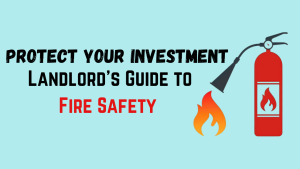
How to Ensure Your Rental Property Is Fire-Safe
Fire safety isn’t just about having working smoke detectors – it’s also about understanding what factors contribute to fires and how best to prevent them. We’ll cover everything from installing extinguishers to making sure combustibles are stored properly. By following these simple steps, landlords will be able to create a safer environment for themselves and their tenants alike.
So let’s get started!
Understanding Fire Hazards
As a landlord, it’s important to understand the potential fire hazards in your rental property and take proactive steps to help reduce risk. Understanding how fires start and spread is key to reducing the chance of an incident occurring and knowing what preventative measures you can implement is crucial.
Reducing clutter within the home is one-way landlords can help protect their tenants from fire-related incidents. Clutter provides fuel for a fire; less clutter means fewer places where flames can quickly gain traction.
Fireproofing materials such as drywall and insulation are also essential, as they slow down flame propagation when ignited, buying more time for occupants to escape safely. It’s especially important for any furnishing with upholstery or fabric covers to meet flammability regulations – these standards exist for good reason.
It’s also advisable that frequently used areas like kitchens contain smoke alarms, sprinklers, carbon monoxide detectors, extinguishers, and other safety products that could be lifesavers if disaster strikes.
Lastly, educating your tenants about basic fire prevention strategies will ensure everyone knows what actions need to be taken in an emergency so they can react without hesitation.
Installing Smoke Detectors
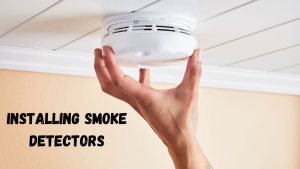
As a landlord, ensuring your rental property is fire-safe should be one of your top priorities.
One of the most important steps for achieving this is to install smoke detectors in every bedroom, outside each sleeping area, and on every level; including the basement.
Smoke detectors are essential pieces of life-saving equipment that detect when there’s an active fire or smoldering fire like those caused by electrical malfunctions or overheating appliances.
When installing smoke detectors at your rental property, it’s critical to consider the testing requirements; both initial installation tests as well as regular maintenance checks.
This includes checking the alarm functionality monthly with a test button, ensuring all batteries are fully charged (or replaceable), and cleaning out any dust build-up around the unit that could prevent proper operation.
It’s also best practice to make sure tenants understand how to use their smoke detectors correctly so they can respond quickly if an emergency arises.
To ensure maximum safety during emergencies, landlords must adhere strictly to these guidelines and remind tenants regularly about the importance of good smoke detector maintenance habits.
With simple steps such as these taken care of, you have peace of mind knowing that your property is better prepared in case of a fire incident.
Installing Fire Extinguishers
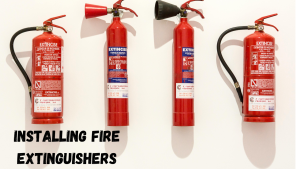
Every landlord should take fire safety seriously. As the old saying goes, an ounce of prevention is worth a pound of cure – and when it comes to preventing fires in your rental property, that adage holds! Installing fire extinguishers is one of the most important steps you can take as a responsible landlord.
When installing fire extinguishers, there are some important requirements landlords must follow. First of all, check with local authorities for any specific regulations or codes governing the installation process.
In general, though, each floor should have at least one fire extinguisher installed; they should also be placed near exits so they’re easy to reach in case of emergency. Additionally, make sure that everyone living at or visiting your rental property knows where these devices are located and how to use them correctly.
There are several different types of fire extinguishers available on the market today, but multi-purpose models tend to be best for residential settings. These come equipped with two agents: water and chemical foam which can tackle most common kitchen fires caused by grease or oil spills.
On top of this, remember to keep up with regular maintenance checks and replace expired (or damaged) fire extinguishers immediately — no excuses! By taking these simple precautions you’ll help ensure your tenants will remain safe from harm if ever faced with a serious housefire situation.
Maintaining Electrical Systems
Maintaining electrical systems is a key factor in ensuring your rental property is fire-safe. It’s important to keep up with any wiring regulations and ensure that each part of the system complies with them.
In addition to complying with applicable laws, there are other steps you can take to keep your tenants safe from electrical fires:
- Have regular inspections by an electrician; this will help identify potential problems before they become dangerous
- Make sure all outlets have tamper-resistant receptacles (TRRs) which prevent children from inserting objects into outlet slots
- Install arc fault circuit interrupters (AFCIs). These devices detect potentially hazardous conditions like arcing or sparking and shut off power quickly if needed
- Use surge protectors when plugging in appliances for added protection against voltage fluctuations that could cause a spark or flame
- Check smoke alarms regularly and change the batteries at least twice a year. This will alert occupants early if an electrical fire occurs in their home
By taking these precautions, you can reduce the risk of starting an electrical fire in your rental property and make it safer for everyone there. Read also this blog for more info What Is Involved In An Electrical Installation Condition Report?
Storing Combustible Materials
Many landlords may think storing combustible materials in their rental property is a necessary evil. However, with proper care and attention, it’s possible to ensure that these items are stored safely and responsibly.
When determining storage for combustible materials, you should always look for cabinets or drawers made of fire-resistant material like metal.
It’s also important to check the expiration date on any flammable liquids or aerosols before choosing where to store them. Keeping these items out of direct sunlight can help extend their shelf life as well.
It’s essential that all combustibles be kept away from sources of heat such as stoves and radiators; even something as simple as leaving them directly next to an electrical outlet could cause problems down the line if not addressed properly.
Taking time to locate potential hot spots around your rental property before deciding how best to store combustible materials will give you peace of mind and make sure everyone living there remains safe from harm.
Regularly Inspecting Appliances
As a landlord, it is your responsibility to make sure that your rental property is fire safe. Regular inspections of appliances can help you identify any potential risks before they become an issue and keep both tenants and the property itself safe.
It’s important to conduct regular risk assessments on all major electrical appliances in the home; including fridges, freezers, washing machines, dishwashers, ovens and boilers. If these items are older or have been tampered with in some way then more frequent checks may be needed. It’s also important to check for wear-and-tear or damage on cords as this could potentially lead to overheating or even fires.
Here are five steps landlords should take when inspecting their rental properties:
- Check appliance age – look at serial numbers and manuals to see how old each item is
- Inspect power cables & plugs – replace worn out parts if necessary
- Ensure correct installation & maintenance – make sure everything has been installed correctly according to manufacturer guidelines
- Test safety switches/circuit breakers regularly – turn off all power outlets individually while monitoring circuit breaker performance
- Provide tenant training on best practices – educate tenants about the proper use of electricity as well as basic preventative measures such as avoiding overloading sockets or leaving devices unattended.
Landlords need to ensure that all appliances meet legal requirements for safety standards; failure do so can result in serious consequences for everyone involved.
By taking proactive steps towards keeping your rental property fire safe through regular inspection and tenant education, you will be able to protect yourself from liability issues whilst providing a secure living environment for your tenants.
Addressing Dangerous Structures
It’s essential for landlords to inspect their electrical wiring regularly – look out for any frayed or exposed wires, and make sure everything is up to code.
It’s also important to identify any flammable materials in the property, like curtains, carpets and furniture, and take steps to ensure they’re kept away from heat sources.
I’d also recommend testing smoke and carbon monoxide alarms to make sure they’re working properly.
Lastly, always check that fire doors are in good condition, with no obstructions blocking them.
Inspecting Electrical Wiring
As a landlord, it is critical to ensure that your rental property is fire-safe.
Regular inspections of electrical wiring in the structure should be conducted to check for any potential hazards or damage.
Testing outlets and inspecting cables are essential steps to take when addressing dangerous structures.
I recommend testing all outlets at least twice per year, as well as examining all cables for signs of fraying and other wear-and-tear issues.
If you find anything out of the ordinary during these tests, contact an electrician immediately to have them address the problem before it becomes more serious.
Additionally, if any of your tenants report flickering lights or sparks coming from their outlet fixtures, turn off power at once and call an electrician right away.
Finally, make sure to get a professional review of all circuits every five years by a licensed electrician.
This will help guarantee that the entire electrical system in place meets safety standards and provide peace of mind knowing that your investment and tenants are safe.
Identifying Flammable Materials
Once you’re done assessing the electrical wiring and circuits, it’s important to look at other potential fire hazards.
Identifying flammable materials is key – even if they are stored far away from heat sources like radiators or electric appliances. This includes combustible items such as fuel cans, furniture that has been upholstered with synthetic fabrics, paper products, rags, and mattresses.
It also means checking for faulty gas lines or wood stoves can be a source of danger too!
To make sure your rental property is safe against fires, make sure all tenants know the location of fire extinguishers and understand how to use them in case of an emergency.
Finally, consider investing in some sort of fire insurance policy so that should anything happen on-site, you’ll have peace of mind knowing that there’s coverage available.
Educating Tenants On Fire Safety
Fire safety is a critical issue for landlords and tenants alike. It should be treated as such, with both parties responsible for doing their part to ensure the rental property remains safe from fire hazards. Symbolically speaking, it’s like two sides of a coin: if one side fails, then so does the other.
The key to promoting awareness and encouraging compliance begins with education. Landlords must educate themselves on local laws and regulations regarding fire safety to ensure they comply with all applicable requirements; this includes having working smoke alarms installed throughout the rental property. They must also provide tenants with detailed information about what to do in case of an emergency or evacuation situation, demonstrating how best to utilize the available resources.
Tenants too have roles in helping create and maintain a safe environment – examining exits regularly; ensuring combustible items are stored properly; never using open flames indoors; understanding that smoking inside can be extremely hazardous; etc.
As part of educating tenants on fire safety protocols, landlords should conduct periodic inspections of the units and/or common areas for any potential risks or violations of rules outlined within tenant agreements (e.g., storing flammable materials). This helps build trust between landlord and tenant while creating an atmosphere where everyone feels secure knowing that proper protocol is being followed by all involved parties.
Developing An Emergency Plan
Now that we have discussed the importance of educating your tenants on fire safety, it is equally important to develop an emergency plan for the property.
Emergency preparedness can be a lifesaver when dealing with fires and other crises. The key elements of this plan should include clear safe exits from each room in case of an emergency, along with designated meeting spots outside the building where people can go if they become separated or disoriented during evacuation.
Furthermore, you will need to make sure all doors leading out of rooms are unlocked at all times and any potential exit obstructions must be removed to ensure everyone’s safety.
You may also want to consider installing smoke alarms and carbon monoxide detectors throughout the rental property as well as conducting regular drills so everyone knows what to do in the event of an emergency.
By taking these steps, you can create a secure environment for both yourself and your tenants while reducing the risk of serious injury or death due to fire-related incidents. With some forethought and planning, your rental property can become a safe haven for those living within its walls.
Keeping A Fire Log
When it comes to fire safety for landlords, keeping a fire log is an essential step.
This document will help you keep track of any changes or updates made to your property in terms of its fire safety regulations and protocols. Not only does this make sure that all the relevant laws are followed, but also allows you to review any information related to episodes involving fires at the rental property so that you can take necessary steps if needed.
Creating such a record helps ensure that any issues about fire safety are properly addressed by reviewing existing regulations and implementing new safety protocols as required.
It should include details like when smoke detectors were last tested or replaced, what kind of equipment was installed during maintenance visits, whether any employees have been trained in proper fire prevention techniques etc. Additionally, make sure to note down where flammable materials are stored in your rental property as well as how often they need to be checked or updated.
By maintaining a comprehensive fire log over time, you can monitor potential risks associated with your rental property more closely and stay on top of any changes regarding its compliance with local fire codes and regulations.
Such vigilance will not only give tenants peace of mind but also provide them with the assurance that their living environment remains safe from potential hazards caused by fires.
Frequently Asked Questions
Are There Any Laws Or Regulations I Should Familiarize Myself With As A Landlord Regarding Fire Safety?
As a landlord, it is important to be aware of the fire codes and regulations that must be followed to keep your rental property safe. Fire safety should always take priority over other aspects of renting out a property.
This includes understanding any local laws or regulations regarding fire drills, ensuring smoke detectors are installed and regularly tested, as well as making sure all appliances meet safety standards.
Familiarizing yourself with these requirements will help you ensure your rental property is up-to-date on the latest fire safety guidelines.
What Are The Best Ways To Educate Tenants On Fire Safety?
When it comes to fire safety, education is key.
As a landlord, the best way to ensure that your rental property remains safe and secure from the dangers of fire is to properly educate your tenants on preventive measures.
This can be done by incorporating regular fire drills into their living routine as well as teaching them about stove safety when cooking meals at home.
By doing this, you’ll give your tenants the knowledge they need to prevent disasters before they happen – an invaluable skill for any homeowner or renter!
Are There Any Special Precautions I Should Take When Storing Combustible Materials?
When storing combustible materials, it’s important to take special precautions in order to prevent fires.
Doing simple things like keeping items away from any heat sources and regularly checking your stored materials for signs of deterioration can help reduce the risk of an emergency.
Additionally, if you’re renting out a property, be sure to educate tenants about fire prevention and how to safely store combustibles- this could go a long way towards ensuring that both the tenant and building are safe!
What Is The Best Way To Inspect And Maintain Electrical Systems?
Inspecting and maintaining electrical systems is one of the most important fire safety measures landlords can undertake.
Electrical hazards in a rental property, such as faulty wiring or overloaded outlets, create a major risk for fires.
Therefore it’s essential that you regularly inspect all electrical components to make sure they are up-to-date with current codes and standards.
Additionally, fireproofing systems should be installed to help reduce any potential damage from a fire caused by an electrical hazard.
With regular inspections and maintenance of your rental property’s electrical system, combined with fireproofing systems, you’ll have taken the necessary steps to ensure your rental property is safe from a fire due to electrical hazards.
Are There Any Additional Safety Measures I Should Consider In Addition To Installing Smoke Detectors And Fire Extinguishers?
Fireproofing and installing smoke detectors, along with fire extinguishers, are two essential steps for ensuring your rental property is safe from fires.
But there are additional safety measures landlords should consider to maximize their tenants’ protection:
- Firstly, make sure all electrical outlets and wiring are regularly inspected by a professional.
- Secondly, install carbon monoxide detectors in any areas where gas-burning appliances (like ovens or water heaters) are being used.
- Thirdly, invest in proper insulation around windows and doors as this will help contain the spread of fire if it occurs.
By taking these extra precautions you can rest assured that your rental property is well equipped to handle any potential emergency.
Conclusion
As a landlord, it is your responsibility to ensure the safety of your tenants and property.
Taking the time to understand fire safety regulations, educate tenants on best practices, inspect electrical systems regularly and store combustible materials safely are all key steps in keeping your rental property safe from fires.
Additionally, installing smoke detectors and fire extinguishers can help prevent catastrophic losses due to fires.
By being proactive about these measures now, you’ll be glad you did if there ever comes a day when they need to be put into action!



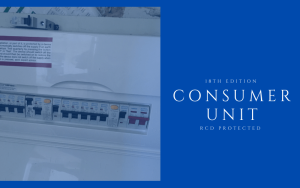


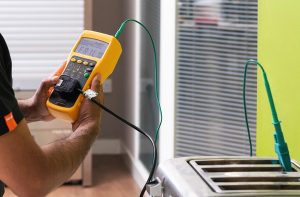
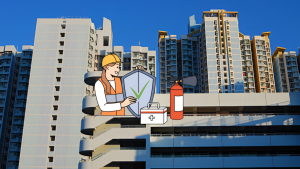
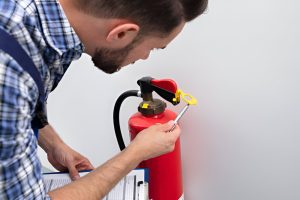
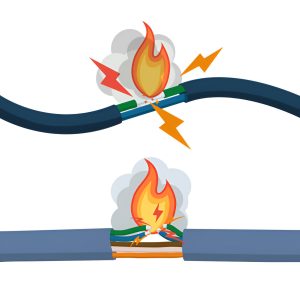

3 thoughts on “Top Tips For Landlords: How To Ensure Your Rental Property Is Fire-Safe”
Your blog is a breath of fresh air.
thank you
For the purpose of producing a concise summary, the summarising tool begins by extracting several sentences from the text that is being provided and then merging them together. Many of the tools that are available online provide you with the opportunity to choose the size of the generated summary based on either the percentage or the amount of words. summarizing tool